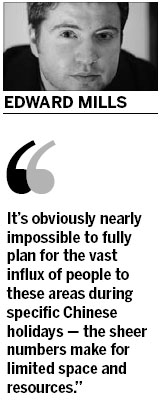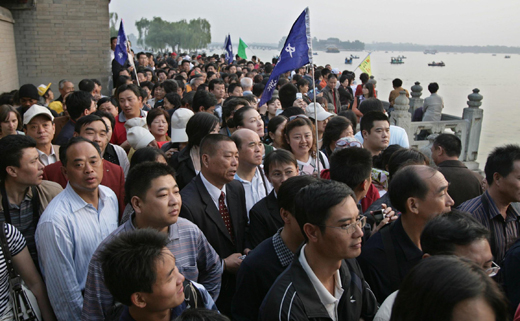Comment
Tourism tips out onto street
By Edward Mills (China Daily)
Updated: 2010-05-20 07:58
 |
Large Medium Small |
|
Tourists are hampered by queues as they circle the lake at the Summer Palace. Yang Dengfeng / for China Daily |
The Summer Palace - a place of beauty. There are few attractions in Beijing that one can truly enjoy as much. Located to the northwest of the city, it is the largest and best-preserved imperial garden in China, and comprises fantastic buildings and a huge lake surrounded and partitioned by bridges and gardens.
It has all the ingredients for a perfect day out: eating a naturally overpriced, but delicious lunch in the corner of Suzhou Street overlooking the water; queuing excessively for a pedal boat that near-loses its appeal instantly, but for the relaxation mid-lake; or walking to a slightly less busy, if not secluded, patch of grass to enjoy an extended picnic.
One just wishes that the opening hours were longer, so you don't have to leave. And that's not just because of the beauty of the Palace and gardens.
The state of the areas in immediate proximity to the Summer Palace is just horrendous! You don't want to step out.
Of course, you are also greeted by this mess when you start your day there, so it doesn't give the best first impression.

The assumption would be that the surrounding areas are cleaned every day, but the filth factor is certainly high by mid-morning. Discarded food packaging and plastic, if not the food itself, are strewn across the pavements and surroundings, causing a considerable dent to the quality of the experience.
This is such a contrast to inside the Summer Palace itself, where great care is taken to present a clean and pleasant environment - if only it extended beyond the gate.
It wouldn't take much to oust the legions of street carts selling food, ranging from dubious to downright disgusting in perceived quality, cut the traffic allowed right up to the entrance and widen the pedestrian areas. Just little things, but the changes would add to the splendor of the atmosphere created inside, rather than detract from it as the current situation does.
Transport links are largely good, with the subway being nearby and a fair stream of taxis and coaches are also available. That said, the Summer Palace is huge, yet the vast majority of people are concentrated at one end. This is due to the significant amount of transport options terminating at this point.
Encouraging people to start from the other side could prove fruitful. There is much to see there, but few seem to get that far due to their starting point! It could also help to cut down the over-crowded areas. Better advertising for the ferries that cut across the lake at various points could also aid tourist concentration.
The Temple of Heaven, located just off a straight South line from the Forbidden City, also suffers from overcrowding and transport problems. Again, there are fairly easy to implement methods to get around this.
Firstly, the ticketing system should be more transparent for visitors. It seems the majority of problems arise from those buying the cheaper ticket at the entrance, only to realize they cannot enter the majority of the sights using it. The significant number changing their minds halfway through gives rise to substantial queuing outside of the main attractions.
Perhaps if it were better highlighted that you require the marginally more expensive ticket for these attractions from the outset, the queues would be reduced and everyone's experience could be enhanced as a result.
Naturally refreshments are excessively overpriced within the walls, as you'd expect. Without wishing to sound too fastidious, a slightly more advanced selection could help some visitors to appreciate their surroundings a little more. Bringing your own for an outdoor lunch is often preferable, but the option to do otherwise would be ideal.
A more efficient taxi rank could also help those who wish to leave by this method, as currently it tends to degenerate into a near-fight between those standing waiting for a cab! Queuing is a more relaxed and civilized process.
Beijing has some truly magnificent tourist sights that minor criticism shouldn't detract from. Despite the problems, returning there many times over the summer months is almost obligatory due their positive points in my opinion.
It's obviously nearly impossible to fully plan for the vast influx of people to these areas during specific Chinese holidays - the sheer numbers make for limited space and resources.
Equally, it's not feasible to keep the streets spotless every second of the day without proper citizen participation and respect for their cultural heritage. A few extra cleaning staff and additional bins won't stop some from discarding their waste into the street without thought.
That said, one should always strive for perfection!
